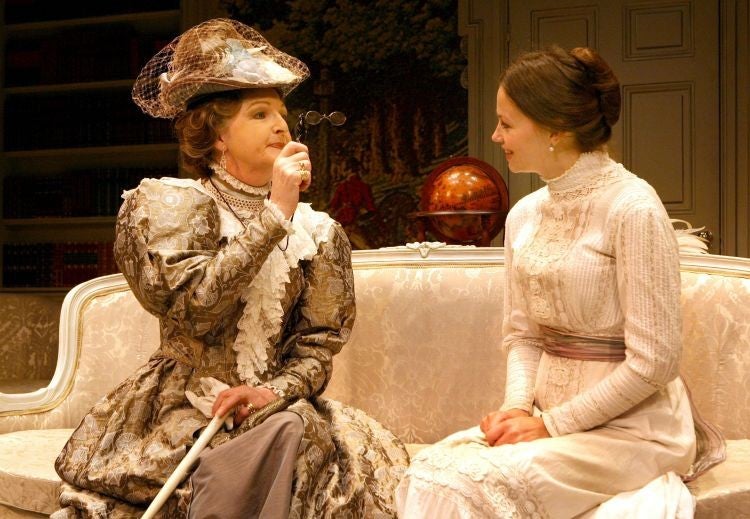The Importance of Being Earnest, Vaudeville Theatre, London
Bags of fun with Lady Penelope

Your support helps us to tell the story
From reproductive rights to climate change to Big Tech, The Independent is on the ground when the story is developing. Whether it's investigating the financials of Elon Musk's pro-Trump PAC or producing our latest documentary, 'The A Word', which shines a light on the American women fighting for reproductive rights, we know how important it is to parse out the facts from the messaging.
At such a critical moment in US history, we need reporters on the ground. Your donation allows us to keep sending journalists to speak to both sides of the story.
The Independent is trusted by Americans across the entire political spectrum. And unlike many other quality news outlets, we choose not to lock Americans out of our reporting and analysis with paywalls. We believe quality journalism should be available to everyone, paid for by those who can afford it.
Your support makes all the difference.There's an amusing theatrical anecdote told about a piquant mishap that occurred during a performance of The Importance of Being Earnest. In the scene where his character is grilled by Lady Bracknell, the actor playing Jack is alleged to have hopped forward in the script, with the result that the grande dame playing Wilde's formidable dowager was robbed of the opportunity of delivering one of the most famous lines in world drama.
During the interval, the poor actor edged with dread to the temperamental star's dressing room, only to be greeted with a warm embrace and a volley of amused gratitude that his error had relieved her of that terrible "handbag?" burden.
This story can't be true – the interview is so tightly written that even the most nerve-racked actor would be saved from jumping the gun – but its currency emphasises how, ever since Edith Evans's dragonish swoop on to the offending word in the well-known film version, the line has become the equivalent of Becher's Brook for any performer tackling Lady B.
So it's refreshing to discover that Penelope Keith, who plays the role now in Peter Gill's deliciously entertaining revival at the Vaudeville, solves the problem by elegantly refusing to make a big deal of it. I have heard all manner of variation on the line – from a Bracknell reduced to a silent, shocked mouthing of the word to a Bracknell who sounded as though she was humouring a lunatic. With Keith, whose performance is a delight in its exquisitely understated authority, the effect is of a sharply cocked eyebrow.
That's of a piece with a production that eschews attention-seeking novelty of interpretation in favour of a zestfully straightforward approach. And top of the list of the pleasures it affords is the hilariously poised aplomb with which the cast negotiate the epigrammatic challenges of Wilde's formal yet seditious dialogue. It's the blithe assurance with which these actors mimic the cadences of Establishment confidence that helps you hear the subversive content in much of what they say.
Keith's Lady B demonstrates her forcefulness by never needing to raise her voice. She may be likened by others to a Gorgon but she manages to be utterly implacable without wasting energy on behaving like a monster. Keith's superlative diction delectably indicates a woman who has become a total stranger to self-doubt. She's so used to being obeyed that she expects people to anticipate her bidding, as when she orders her daughter to sit down and impatiently declares that "Hesitation of any kind is a sign of mental decay in the young".
There's a wonderful tension between her supremely seamless impression of immemorial good breeding and the hints she throws out that she herself is arriviste who knows that, far from being God-given, rank is a system that can be worked by anyone with a strong enough instinct for impersonation and gold-digging: "When I married Lord Bracknell I had no fortune of any kind. But I never dreamed of allowing that to stand in my way."
Gill's handsomely designed production boasts a well-nigh ideal cast. Daisy Haggard's excellent Gwendolen, lisping, wide-eyed and toothily determined to the point of predatoriness, gives notice that she's a chip off her mother's indomitable block, while Rebecca Night's splendid Cecily wittily conveys the rebelliousness of spirit lurking beneath the creaminess of her decoy-like docility of manner, applying just the right pressure to the give-away details, such as the last word in the line: "His voice alone inspires one with absolute credulity."
William Ellis and Harry Hadden-Paton as, respectively, Algernon and Jack, are pitch-perfect in their winning accounts of spoilt, playful, sexually ambiguous scions of the idle rich. In a nicely perverse touch, Janet Henfrey as the belatedly exposed Miss Prism, hits notes that would not disgrace a conventionally conceived portrayal of her nemesis, Lady Bracknell.
By Paul Taylor
To 26 April (0844 847 1722)
Join our commenting forum
Join thought-provoking conversations, follow other Independent readers and see their replies
Comments